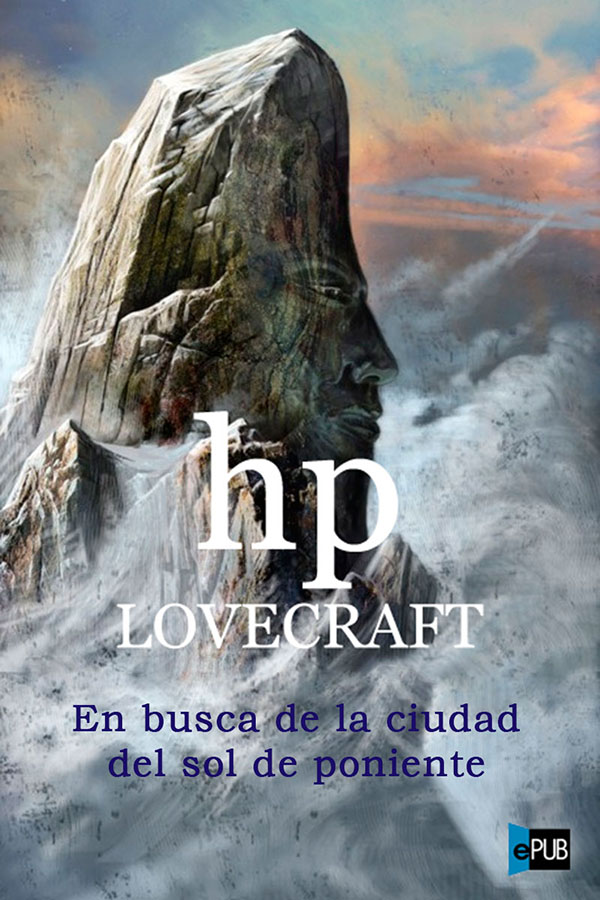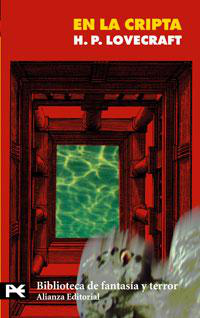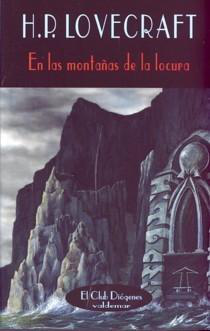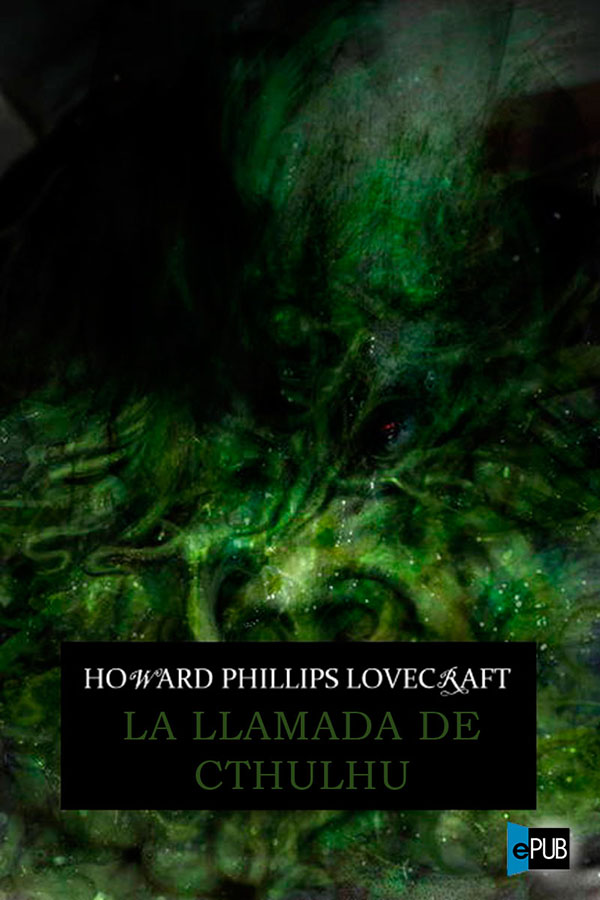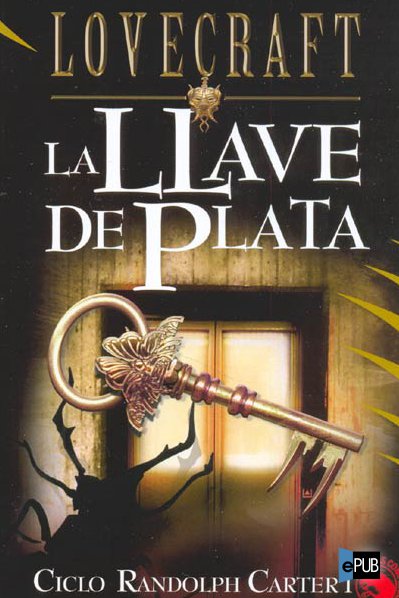oleebook.com
Hasta en los Mares de Lovecraft, H. P.
de Lovecraft, H. P. - Género: Ficcion
Sinopsis
Lovecraft, H P Year: 2009
Descargar
Descargar Hasta en los Mares ePub GratisLibros Recomendados - Relacionados
Reseñas Varias sobre este libro
"Nada se agitaba en la polvorienta llanura ni en la desmenuzada arena de los lechos de ríos desecados mucho tiempo atrás, por donde una vez fluyeran los caudalosas corrientes de la juventud de la Tierra. Había poco verdor en aquel mundo terminal, aquel capítulo final de la prolongada presencia de la humanidad sobre el planeta
El hombre, degenerado y exhausto, no pudo hacer frente durante mucho tiempo al calor que ascendía inexorablemente. Se consumía, y la evolución era demasiado lenta para dotarle de nuevas resistencias...
De las densas muchedumbres y actividades multitudinarias del pasado no quedó finalmente nada. Entonces, allí se alzaron, contra los desiertos sin lluvia, las ahuecadas torres de hogares vacíos, factorías y estructuras de todas clases, reflejando la deslumbrante radiación del sol y agostándose bajo el cada vez más intolerable calor."
"Fue una épica, una titánica tragedia cuya trama no fue revelada a los actores: el total abandono de las ciudades del hombre. No llevó siglos ni eras, sino milenios de crueles cambios. Y aún continuaba... sombría, inevitable, brutalmente devastadora.
y, al fin, la herencia de un pasado inmemorial fue abandonada. La decadencia tanto física como cultural surgió con el insidioso calor. Ya que los hombres habían vivido tanto tiempo cómodos y seguros que este éxodo de pasados escenarios fue difícil. Tales sucesos no fueron recibidos Temáticamente, su misma lentitud era aterradora. La degradación y el desastre fueron pronto comunes, los gobiernos se disolvieron y las desamparadas civilizaciones se sumieron en la barbarie."
"Ahora, en efecto, había llegado un final y clímax para todos los esfuerzos de la humanidad... ¡cuán monstruoso e increíble clímax a ojos de aquellos pobres necios complacientes de los días prósperos! Nunca más conocería el planeta el atronador hollar de millones de humanos... ni el reptar de los lagartos o el zumbido de insectos, ya que ellos también se habían ido. Había llegado el reino de las ramas sin savia y de los interminables campos de marchita hierba. La Tierra, como su fría e imperturbable luna, se había sumido en el silencio y la oscuridad para siempre."
Una historia sobre el fin de los tiempos. Como efecto colateral del propio actuar del ser humano, provocando el calentamiento global, radiación. Pero no es un final rápido e indoloro, es un final prolongado, angustiante y muy doloroso. El ser humano luchando, intentando adaptarse, mutando y mudando, solo para prolongar la agonía y para, al fin de cuentas, no dejar una mínima huella. Haciendo ver al ser humano como algo totalmente ínfimo, invasivo y autodestructivo.
Como suele pasar en varias de las colaboraciones de Lovecraft con otros autores/ "amigos", sale un poco de sus temas preponderantes. Aquí con una visión de lo que considera el futuro, viendo bastante mas lejos en el horizonte... Cuando habitualmente era alguien aferrado al pasado,a la nostalgia o que escribía sobre algo que asechaba, despertaba en un tiempo presente/ inmediato/próximo.
Una historia que resulta muy actual, poderosa y que no te deja indiferente.33 s Benjamin Uke372 42
H. P. Lovecraft wrote a post-apocolpytic story with R. H. Barlow "Till A' the Seas" follows the sun
The climate on Earth is getting warmer and warmer, oceans are slowly disappearing, and the last man on earth falls into the a last well on earth and dies.
Humanity ends.
Not with a bang, but a whimper.
It'd've been funny if that was the goal.horror short-story-novella11 s Jazzy Lemon991 100
The polar icecaps have long melted and the seas have become desserts.american-authors classics6 s1 comment Tom2,442 41
3.5 Stars rounded up to 4 Stars.2 s Thor The Redbeard212 33
3*adventure-fiction history-fiction2 s ? Irena ?1,652 221
by H.P. Lovecraft and R.H. Barlow
The sun is going to scorch the Earth. Eventually. It's going to take its sweet time to get to that point, though. In the meantime, people will move from hotter parts and away from the unforgiving sun. They are going to forget the past, they won't believe there was a time when water was everywhere.
Until only one man is left.
Not very cheery picture of the future, but the way human behaviour is described, not even the most optimistic person could say it's not possible. We would act exactly that. 'The race of man, too puny and momentary to have a real function or purpose, was as if it had never existed.' horror12 s ????????? ??????709 43
Wordsworth Editions
London 2010.
A distant future "last man" story that depicts a world when Earth is on its knees in a sense that the Sun has grown so much that it is very close to the Earth.
Just the "last man on Earth" topos reminded me of this great film https://www.imdb.com/title/tt0067525/. Just that you know this film from 1971. was the first American film with an interracial kiss.
A very creative story and unusual for Lovecraft who is obsessed about the distant past with its Cthulhu mythology, not about the distant future. Also that fact is very modernist so it is unusal that antimodernist Lovecraft would write a story that folllows some lame scientist prophecy about the end of the world. Seeing history as a line and seeing an ending without any metaphisical relation is very dogmatic and narrow-minded, thus typical for modernism with its scientism.
It is really interesting how scientists are the Church of our time, they are the know-it-alls, just medieval priests. Only diference between today s scientists and medieval priests is that medieval priests use logic (I am now on the 250th page of "Suma Contra Gentiles" by Aquinas) while modern scientists use elements of literature (Nat Geo documentaries that depict a story in them, Neil deGrasse Tyson is a character who travels in space ships to show what our rulers know about the universe).
Come on liberals, you can do it better...
Or at least https://www.youtube.com/watch?v=x4aJG...
¡Hasta luego weones y weonas!1 Kari Ivanova277 3
?????, ?????? ???????? ?? ???????. ???? ?????, ???? ????. ???? ? ????? ?? ????????????!
???? ?? ???? ???????? ?? ?????? ??????? ?????? ? ??????????? ??? ? ????? ?? ?????????? ?????????? ???????? ?? ???????? ?? ???????????? ? ??????????? ?? ?????? ????? ?? ?????????????? ?? ,??????? ? ????????? ? ??????????????? ?? ?????????? ? ????? ?? ????????????? ?????? ?? ????? ?? ??????????????!
2021 horror short-stories1 Thomas Houghton189 4
A great post-apocalyptic account of the struggles mankind faces as a result of the sun overheating the Earth and causing all the water to dry out. The writing is poetic and beautiful - despite the somber nature of the topic, and provides some intriguing afterthoughts regarding how we treat our planet and our surrounding environment.1 Keith556 9
Lovecraft #97: Till A the Seas (1935, with R.H. Barlow)
The stars whirred on; the whole careless plan would continue for infinities unknown. This trivial end of a negligible episode mattered not to distant nebulae or to suns new-born, flourishing, and dying. The race of man, too puny and momentary to have a real function or purpose, was as if it had never existed. To such a conclusion the aeons of its farcically toilsome evolution had led.
[Tree (2017) by Max Mitenkov]
Till A the Seas is much better than the earlier collaborations between Barlow and Lovecraft. It feels the work of thoughtful rather than the creation of teenager that Barlow was at the time. We have a gloomy, depressing post-apocalyptic tale of the last humans dying out in a world blighted by global warming.
A typescript by Barlow still survives, so we have a pretty good idea of which author contributed what. Barlow appears to have come up with the idea and written the first draft or drafts. Joshi & Schultz (2001) write that Lovecraft made no significant structural changes, merely making cosmetic changes in style and diction (p. 268). They do not that HPL appeared to have written the bulk of the concluding section (p. 268), including the lines about mankinds cosmic insignificance that are quote at the beginning of this review.
Till A the Seas is arguably the 97th oldest extant story by American weird fiction author Howard Philips Lovecraft (1890-1937), and his fourth of six collaborations with Robert H. Barlow (1918-1951). I am reading all of HPLs fictional works in chronological order. This story was written while HPL was in the middle of writing the great science fiction novella The Shadow out of Time.
Title: Till A the Seas
Author: R.H. Barlow with H.P. Lovecraft
Dates: January 1935 (written), summer 1935 (first published)
Genre: Fiction - Short story, horror, post-apocalypse literature
Word count: 3,307 words
Date(s) read: 5/17/22
Reading journal entry #158 in 2022
Sources:
Link to the story: https://hplovecraft.com/writings/fict...
First publication citation: The Californian vol. 3, no. 1 (Summer 1935): 37.
Joshi, S. T., & Schultz, D. E. (2001). An H.P. Lovecraft Encyclopedia. Greenwood Press.
Link to the image: https://www.deviantart.com/vimark/art...
Written on 5/17/222022-reads fiction horror-sci-fi-fantasy ...more Per935 9
https://en.wikisource.org/wiki/Till_A...
Another Lovecraft collaboration with Robert H. Barlow. The title of the story is from a song(*) by Robert Burns (set to the tune of Grahams Strathspey.)
A red, red rose
O, my luves a red, red rose,
Thats newly sprung in June:
O, my luves the melodie,
Thats sweetly playd in tune.
As fair art thou, my bonnie lass,
So deep in luve am I:
And I will luve thee still, my dear,
Till a the seas gang dry.
Till a the seas gang dry, my dear,
And the rocks melt wi the sun:
I will luve thee still, my dear,
While the sands o life shall run.
And fare thee weel, my only luve!
And fare thee weel a-while!
And I will come again, my luve,
Tho it were ten thousand mile.
(*) https://www.gutenberg.org/files/18500...
https://www.tor.com/2016/11/30/farcic...yog-sothothery Rizzie494 4
Wow, this might actually be one of my favorite Lovecraft stories. Talk about cosmic indifference. This basically starts out as "H.P. Lovecraft's DUNE" but quickly becomes something much scarier, and much too real. The first half is a macro look on the slow, painful end of the world, and the second half a micro examination of the human side of things. It works really excellently. While the concept itself is a bit different for Lovecraft, the themes here are familiar, and perhaps executed better than many of his more famous tales. Perhaps what makes this particular story so effective is how uncomfortably close to reality Lovecraft's apocalyptic vision is for the future. He couldn't have known about human-caused climate change, and yet he describes its cost in great detail. Spooky. Oleksandr Fediienko555 52
??????????? ????? ????? ? ????? "??? ???????" (?????? ? ?????????? ?????? ??????) ??????? ??????.
? ??? ??????? ?????????????? ??? ????? ???????. ????? ????????? ??????????? ?? ?????, ?? ???????? ???????? ???????????? ? ????????????? ????, ? ????? ?????? ?? ???????. ???????? ???? ?????????? ???????????, ??? ??????????? ?????? ? ??? ?????????.
??? ????? ????? ???????, ??? ??????? ?? ??????? ?????????? ?????? ????? ????. ????? ??? ????. ???? ??????????? ???? ????? ??????? ?? ????, ??, ?? ??????, ?????? ???? ???? ????. ?????????? ??????? ?????????, ??? ????????? ??? ?????? ??????. ????????? ???????? ? ???????, ??? ????????? ?? ????????, ??? ???????? ??????? ????, ??? ?????????, ????? ? ???????? ???? ??????. ????? ????? ??????. Angel Gabriel41 5
Un relato en colaboración, un poco diferente a lo que se está acostumbrado con Lovecraft, pero con la misma esencia, una pequeña historia del fin de la humanidad, del fin del mundo en general, el fin desolador del planeta tierra, y el universo ni se inmutó por ello.
Lovecraft siempre nos recuerda lo insignificante que somos en este vasto universo. AoC96 1 follower
Collaborative work between Lovecraft and Barlow portraying Earth far into the future as humanity takes its very last gasps. I found the "future history" part of the story more engaging than Ull's adventure, but considering Till A' the Seas is public domain and really, really short you should read it for yourself. Expect a very definite tone of nihilism and futility, though. Michael126 72
Very well written, perfectly communicates Lovecrafts philosophy of a meaningless but not intentionally hostile world. I dont know how much Barlow contributed to this, the style is distinctly Lovecrafts. But thats good. It seems an early warning on climate change. But this climate change is not man made. Goran LowieAuthor 11 books37
I didn't think it was particularly good, more so... interesting. This is Lovecraft's attempt at a "Dying Earth" type of story (in fact-- it's even listed on the Wikipedia page for the "Dying Earth" subgenre as the first example). It's interesting to see this mix of typical Lovecraftian stuff in a Dying Earth setting. Two examples:
"It cannot be described, this awesome chain of events that depopulated the whole Earth; the range is too tremendous for any to picture or encompass. Of the people of Earths fortunate ages, billions of years before, only a few prophets and madmen could have conceived that which was to comecould have grasped visions of the still, dead lands, and long-empty sea-beds. The rest would have doubted . . . doubted a the shadow of change upon the planet and the shadow of doom upon the race. For man has always thought himself the immortal master of natural things. . . ."
"And now at last the Earth was dead. The final, pitiful survivor had perished. All the teeming billions; the slow aeons; the empires and civilizations of mankind were summed up in this poor twisted formand how titanically meaningless it all had been! Now indeed had come an end and climax to all the efforts of humanityhow monstrous and incredible a climax in the eyes of those poor complacent fools of the prosperous days! Not ever again would the planet know the thunderous tramping of human millionsor even the crawling of lizards and the buzz of insects, for they, too, had gone. Now was come the reign of sapless branches and endless fields of tough grasses. Earth, its cold, imperturbable moon, was given over to silence and blackness forever.
The stars whirred on; the whole careless plan would continue for infinities unknown. This trivial end of a negligible episode mattered not to distant nebulae or to suns new-born, flourishing, and dying. The race of man, too puny and momentary to have a real function or purpose, was as if it had never existed. To such a conclusion the aeons of its farcically toilsome evolution had led." FameL142
Wow, thats really a depressing one. Loved it. This short journey of the main character is just too sad. The story isnt very deep, but it redeems itself by being beautiful in its own, apocalyptic, way.lovecraft Eija722
Kunnes katoo meretkin LucianTaylor195 2
The apocalyptic vision towards where the planet is heading to ?????????455 3
????? ??????????, ??? ???? ??-?? ??????? ? ?????????. ??????? ?????? ??????? ???? ????? ????????. ??? ??? ??????????? ? ??????????? ???????? ????? ????????? 0 ????? ???????! mabuse cast84 4
Damn this was fucking bleak even for Lovecraft/R. H. Barlow!
A very grim tale of cosmic indifference indeed! John Esse343 18
A kinda cool collaboration about climate change, surprisingly. Not enough "lovecraft" for me though. Marco1,181 57
An interesting story describing the end of the human race in a slowly warming world. It would be even better if not for few xenophobic missteps (as often the case in Lovecraft's stories).
The book is broken in two parts. The first describes the events that took place on Earth from a few thousand years to a few million years after the present day. The climate on Earth is getting warmer and warmer, oceans are slowly disappearing. People are gradually moving towards the poles, becoming more and more barbaric. Mankind is steadily dying out because of the lack of water, until there are only a few decades left. The second part starts in a small village in the desert. There is only one man left in the village: young Ull. A very old woman, the only company for the man, died just before. Ull starts a journey in search of other people using his knowledge of old legends. In a few days, extremely thirsty and tired, he finds a small settlement. Ull enters one of the houses and finds nothing but a dried-up old skeleton. Depressed, he starts searching for water and finds a well with a little water in it. Trying to reach the string to pull up a dip-bucket, he falls into the well and dies. And after the death of the last man, mankind totally has vanished. A farce, named "evolution", faces a natural conclusion.sci-fi Sohail472 12
A very beautiful tale of the mankind's last days on Earth. The first chapter is a mere introduction. The real substance of the story lies in the second and final chapter, which is short, sad and memorable.favorite-horror Ty3
Short, sweet, and to the point. Debated on giving three stars because its so short, but has the bones of something that could have been a lot longer and much more developed. Its too bad it wasn't. Claire OrionAuthor 11 books30
Entre Barlow y Lovecraft se escribió una profecía que puede cumplirse perfectamente. Es un relato muy triste pero, a la vez, me ha encantado. <3 Noah Rozov106 1 follower
H.P. Lovecraft "Till A the Seas "1935. Another Lovecraft's failed attempt to portray his attitude. Such a waste. Sarah519 25
Autor del comentario:
=================================
